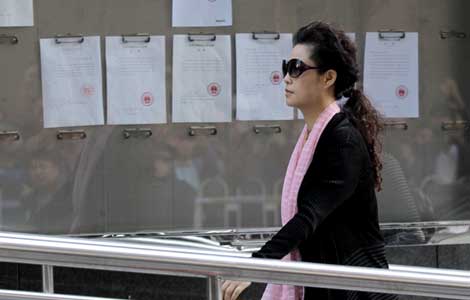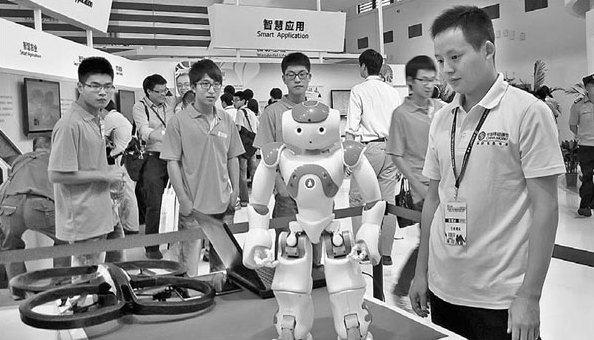Smart enough for the big city?
Updated: 2013-09-27 07:07
(China Daily)
|
||||||||
Consulting | Meng Jing
Analysts pose the question as urbanization proceeds at rapid rate
Experts and insiders believe smart city solutions-based information and communication technology can help China meet its urbanization challenges. But the real question is: "How to put that vision into action?"
China is facing a "trilemma" - a difficult choice from three options - on its way toward more urbanization, said Peter Lacy, managing director of Accenture Sustainability Services Asia-Pacific, who sees smart cities as being the solution for the challenges China is facing in terms of managing problems associated with it.
|
An exhibitor shows a robot at the Smart City Expo China 2013 in Ningbo, Zhejiang province, on Sept 6. Hu Xuejun / For China Daily |
"The increasing population moving from rural areas to cities, the increasing consumption and expectation of citizens as they are getting wealthier and the increasing difficulties in managing the natural resources of energy, water and waste are going to haunt China for the next 30 years," said Lacy.
China is going through an unprecedented urbanization in human history, which has not only transformed the country into the second-largest economy in the world but also attracted more than half of its population to live in cities.
On the one hand a city needs to grow economically. On the other it also needs to improve the quality of its people's lives. Clearly cities are the key to achieve the balance, Lacy said, adding the most critical enabler is going to be smart technology, an idea that makes city management more efficient via collecting and analyzing data.
According to the report Smart 2020, published by Accenture Plc, deploying smart technologies in areas such as electricity grids, transport, logistics, buildings and industrial motors could save 15 percent of global emissions in 2020 and about $900 billion a year by then in energy savings for global industry.
"With the development of technology, it is cheaper and cheaper to put chips everywhere and it is easier and easier to collect data from chips," said George Thomas, a senior executive at IBM, which first developed the concept of smart cities in around 2009.
"Because we are able to collect the data, dig into the data and analyze the data, we are able to answer questions better than before," said Thomas, who is in charge of smart city business in China.
According to him, not only is it possible to predict traffic 60 minutes in advance by analyzing patterns from historical data, people can also ask questions, which they had never thought about asking before.
"This is part of the intelligence and it is really the cool part," Thomas said, adding that from IBM's perspective, smart cities should use an intelligence network to make things better and improve people's lives.
With the ongoing urbanization in China, cities will become bigger and more complicated in terms of management. McKinsey Co estimates that China will have 10 to 12 mega-cities with populations of 15 to 20 million, around which city clusters will form.
A cluster consists of one mega-city and 20 to 50 other smaller cities. Most of the population will live in medium-sized cities with populations of between 500,000 and 5 million, it added.
It seems that the Chinese government has also reckoned that smart technology can help the country on its way toward urbanization. A list of 103 cities, districts, towns and industrial zones from Lhasa in Southwest China's Tibetan Plateau to Shanghai in well-developed East China, have been earmarked recently by the Ministry of Housing and Urban-Rural Development to develop smart city pilot schemes.
The list released in early August is the second batch of smart city pilots in China. The first batch of 90 pilots was published in January.
Apart from the environmental and social challenges brought by urbanization, the desire to find a new engine to drive the national economy amid recent slowing down is part of the reason for the Chinese government's proactive measures to boost smart city development, said Liu Xu, a senior analyst of smart cities with CCID Consulting, an affiliated research organization under the Ministry of Industry and Information Technology.
"By integrating information and communication technology with the development and management of cities, the government hopes to bring the country's economic and industrial development to the next level," she said.
However, it is easier said than done.
"Smart city solutions are not as simple as having information technology. They are solutions that integrate many economic and social factors to ensure sustainable growth for cities and improve the living standards of urban residents," Yin Zheng, senior vice-president of Schneider Electric in China, which began proceeding with smart city solutions by aggressively acquiring many leading IT solution providers in 2011.
"For example, we need to consider how to best work with governments and investors, how to set appropriate prices for our services and who will enjoy and benefit from our services," he said, adding that funding models are the key.
However, Accenture's Peter Lacy said the challenge on the money side will not affect the development of smart cities in the long run. But to truly transform the large number of China's smart pilots into real functional smart cities requires more than money.
"The real challenge is how to put the ambition into action. There's still a big gap between rhetoric and reality," Lacy said. He used the term "pilot paralysis", meaning projects get bogged down in the pilot stage.
Liu said there are so many cities rushing to build smart projects but so few of them truly embed the available technology with a master plan for their cities' development.
"What's more, a common standard of evaluating smart cities is much needed in order to achieve the sustainable development of the sector in China," Liu said.
(China Daily 09/27/2013 page16)

 Serena Williams back to Beijing for new crown
Serena Williams back to Beijing for new crown
 'Battle of the sexes' to start China Open
'Battle of the sexes' to start China Open
 US astronaut praises China's space program
US astronaut praises China's space program
 Christie's holds inaugural auction
Christie's holds inaugural auction
 Aviation gains from exchanges
Aviation gains from exchanges
 Early fish ancestor found
Early fish ancestor found
 Singers' son sentenced to 10 years for rape
Singers' son sentenced to 10 years for rape
 Djokovic announces engagement to girlfriend
Djokovic announces engagement to girlfriend
Most Viewed
Editor's Picks

|

|

|

|

|

|
Today's Top News
Can the 'Asian pivot' be saved?
Trending news across China
Overseas entrepreneurs connect with reform
Russia to guard Syria chemical weapon destruction
Interpol issues arrest notice for 'white widow'
US astronaut praises China's space program
Wang, Kerry meet second time
China to join talks on trade in services
US Weekly

|

|







